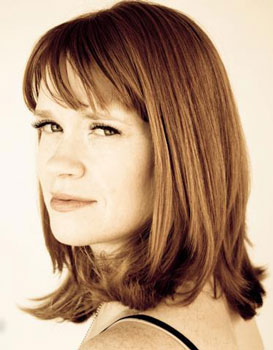PMS 15 | 2016
JM
You have been quoted as saying that writing about Ronan’s Tay- Sachs diagnosis was “cathartic” rather than “therapeutic.” Can you elaborate on what the writing process did for you as you struggled through such a tragic situation?
EB
The root of the word “catharsis” means to strip away, which I take as a directive: to write only what’s essential, to live only in the maximum truth. There’s beauty in this process, even if the truth is brutal. Looking at things head on, for me, has always been a kind of coping mechanism, and in the course of Ronan’s illness, it served me well. When I was writing this book, I was miserable, and writing for the first (and possibly, I hope, LAST) time, became a source of comfort. In other words, I finally got a break. By engaging in making art, I could think about something hopeful, because there is hope in the act of making something out of nothing. I think art that is energized by this NEED to express oneself is some of the most satisfying art, perhaps because it makes the art feel necessary, whereas sometimes (and I've noticed this a lot more lately, especially in literary fiction), there's a tendency for an ironic distance to permeate the prose in a way that, at least to me, feels off-putting and impersonal. Although I'm not in an actively tragic state of mind at the moment, I carry that tragedy with me—I feel it every day; when I deal with having a disability, and when I think about Ronan. In that sense, being a writer has been an important part of my ability to carry on and seek happiness. I certainly feel that my capacity for joy—creative or otherwise—has expanded as a result of going to the bottom of the grief well and thrashing around there for a great many months.
 JM
JM
What does your writing process for nonfiction work look like? Are there any specific quirks or superstitions you find yourself employing?
EB
I like to do research as a way of avoiding the actual writing! My teacher in graduate school called this avoidance behavior. I also tend to write around the issue and find my way in somehow. In the new book I'm working on, I had an epiphany in a yoga class, which struck me as ridiculously cheesy, but it really was where the beginning of the book (at least in this draft) broke open, so I ended up beginning the preface with that realization. For me, once I'm hooked into a project, then I can't help picking at it. It's like having a zit or something—you just can't help yourself! But until you get hooked, it can be a bit dispiriting. I don't have any superstitions, although I prefer to write in bed.
JM
Many writers interested in producing nonfiction work find themselves asking, “Why would anyone want to know about my life?” What advice would you provide for these aspiring nonfiction writers wondering about how to get their process started?
EB
You need to look around at the other books in the world that are like yours or approach the same subject. What will you be contributing to the conversation? If you can’t answer that, then you should wait, or come up with another idea. The “WHY DOES THIS MATTER?” test also has to do with the necessity of including reflection in a piece of writing, a view from the “time of now” narrator’s writing voice. Otherwise, readers can’t make sense of what’s going on, and then they don’t understand why it would matter to keep reading. I do a ton of research into topics I'm interested in writing about. For example, my new book is about resilience, and although there are two books coming out about that topic, they are from a social scientist's perspective, and both assume that one can "overcome" one's traumas in some significant way, and that's exactly what my book is arguing against. That said, if there were 100 books coming out about paperclips, a good writer would be able to write the best book about paperclips. After all, there are only so many stories in the world. It's all in the telling.
JM
In what ways has The Still Point of the Turning World been received by those dealing with their own personal tragedies? How do you feel about your readers’ reactions?
EB
The letters that mean the most to me are those from parents of terminally ill children. It’s such a lonely world, that world, and to know that they felt less alone in such a dark place comforts me somehow. Of course, I get some interesting hate mail, but that can be weirdly amusing. It can be difficult to bear the emotional burden of different readers, but I'm glad that the book resonates with people who are struggling. I know how important it is to feel like you're not alone in a tragic situation.
JM
What is your favorite element of your personal writing process?
EB
When the first and hardest stage is over, and the revision puzzle begins. I like feeling like I'm digging deeply into the idea or the characters, when the book starts to feel like a living, malleable, POSSIBLE thing that is just barely out of reach. It's the most exciting stage. You're reaching for the carrot, but you can see it's a carrot. You're no longer reaching for a mystery. It's that working in the darkness, having no clue what you're doing that is the hardest part of the writing process.
JM
Tell us a little about what you’re currently writing. What will be the next book from Emily Rapp Black?
EB
I’m working on a novel about a woman’s experience of the afterlife, as well as a nonfiction book that is a study of resilience in the modern age. The resilience book, To Dance Again (tentative title), is still in the nascent stages, but I'm starting to feel my way through the outer layers of the topic to the core, and then I'll work my way back out again. It's been actually fun, in part because I don't feel the race against time that I did with Still Point.



